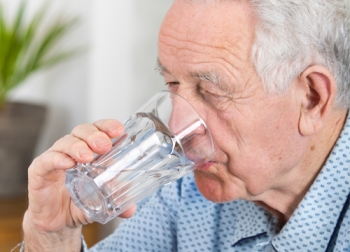What is Dehydration?
Dehydration is a term used to describe an excessive loss of water which disrupts the body's normal functions. Dehydration takes place when an individual loses more fluids than they take in. Chronic elderly dehydration is a common problem for many elderly patients in the United States.
It might not be the first thing that occurs to you when you think about the dangers faced by an elderly loved one but elderly dehydration should be a major concern. Many medications can cause dehydration including blood pressure and anti depression medications.
The elderly feel thirst less strongly than younger people and may have a more difficult time getting up on their own to get a glass of water or may forget to due to dementia.
Also, kidney function frequently deteriorates as we age, making them less able to conserve fluid. So your elderly loved one has a higher likelihood of being dehydrated than you might think for a variety of reasons.
Causes and Risk Factors in Older Adults
A decline in total body fluid. As we age, the amount of fluid in our bodies begins to decrease. This means there are fewer water reserves available for your body to use as you get older.
Lowered thirst response. Feeling thirsty is your body's way of letting you know you need water. However, because the thirst response becomes weaker with age, older adults may not know they need to drink.
Decreased kidney function. The function of the kidneys can decline with age, meaning that more water may be lost through urination.
Health conditions and medications. Some older adults have underlying health conditions or take medications. In some cases, these conditions or meds can lead to an increase in water loss through urination.
Symptoms of
Dehydration
Confusion and disorientation.
Elderly people can become confused for a variety of reasons;
dehydration is one of them. It also comes with physical symptoms
that include dizziness, difficulty walking, and disorientation.
Drop in blood pressure. If
you're actively monitoring the person's blood pressure, you'll be
able to tell immediately if there is a drop. If you're not, you may
also notice that the person does not sweat or produce tears, has an
unusually rapid heart rate, gets dizzy when going from lying to
sitting or standing quickly, has a sticky or dry mouth and tongue,
and the eyes have a sunken appearance.
Skin that won't bounce back. Gently
pull the skin on the back of the patient's hand up, and hold it
there for a few seconds before letting go. If the skin does not
bounce back within a few seconds, it is a symptom of dehydration.
Trouble using the bathroom. If
your loved one does not urinate or defecate as often as usual, or if
the urine is dark in color, it is a sign of dehydration. Urine
should be fairly light in color; darker urine indicates a high
concentration of minerals and other contaminants that urine flushes
out of the body. The more dehydrated a person is, the more
concentrated their urine will be. In more severe cases, stool might
be black or bloody.
Exhaustion and changes in mood.
Dehydration can also make people irritable and tired.
Steps You Can Take...
In mild cases, dehydration can be treated easily by drinking water
or a sports drink such as Gatorade. Over the long term, it is
important to make sure seniors know to drink even when they don't
feel thirsty as the urge to drink can be less strong in seniors. It
can be helpful to keep a glass or bottle of water on a bedside table
or near a favorite chair, within arm's reach, at all times. This is
especially important for seniors with mobility challenges.
If your elderly loved one is living
in a senior care facility such as a nursing home or assisted
living facility, check to make sure certain safeguards against
dehydration are in place.
Specifically, your loved one
should be weighed every day; if they have lost a pound or two
overnight, this could be a sign of dehydration. The staff should
help residents with drinking and make sure water is available at all
times, not just at meals, and easily within reach for people with
mobility issues.
Sometimes, dehydration can get more
severe. If your loved one has had diarrhea for more than 24
hours, has black or bloody stool, or has trouble keeping fluids
down, it may be a good time to call 911.
Dehydration can be a problem for people of all ages, but is
especially worrying for older adults. However, it can also be fairly
easily prevented. Look for the signs of dehydration and make sure
your older loved one has water available at all times, and you can
go a long way toward preventing elderly dehydration.
Related Articles About Healthy Aging:
Home | About | Articles | Resources | Site Map | Privacy Policy
Elder Options of Texas
Copyright 2001-2024
All Rights Reserved
DISCLAIMER: Links to other websites or references to products, services or publications do not imply the endorsement or approval of such websites, products, services or publications by Elder Options of Texas. The determination of the need for senior care services and the choice of a facility is an extremely important decision. Please make your own independent investigation.


